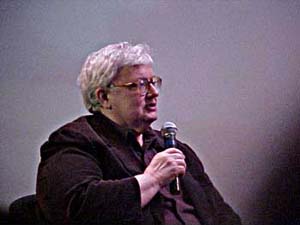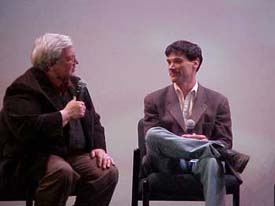|
As the only film critic
that hosts his own annual film festival, Roger Ebert doesn’t
need to prove his dedication to cinema. His many readers
and viewers admire his opinions because of his intelligence
and practical approach to the films he sees, a humble,
not hifalutin’ critic who conveys the sense of being
just another movie buff like us.
Last year, Grant
Rosenberg
attended the Overlooked Festival in Champaign-Urbana,
Illinois, covering
it for Gadfly Online.
Recently he presented ten questions to Ebert about this
year’s festival, his newly published essay collection
of The Great Movies,as well as the concept of evolving
tastes in cinema–while catching a little hell in
the process.
1. The fourth Annual
Roger
Ebert's Overlooked Film Festival
takes place next month from April 24th to the 28th.
How has it grown since the first festival in 1999?
Well, we're limited to about 14 screenings, so all that
has grown is the audience. We now sell out a majority
of screenings in the 1,500-seat house. Lots of out of
town visitors.
 |
2. Can you describe the
process of how the fourteen films are chosen?
I keep a kind of running inventory of films I love that
I think deserve more attention. I run across them
at festivals, at screenings, on video, or in my memory.
I try to find some kind of balance of old, new, doc, fiction,
US, foreign, indie, Hollywood, whatever.
3. You've been writing editorials for the Sun-Times
for awhile now, matters of politics and national debate.
How did this come about and what has been the reaction
to these writings?
I've been doing op-eds pieces occasionally for several
years. Those who like them, like them. Those who don't
tell me to stick to movie reviewing. My critics on the
left send long, detailed, argumentative e-mails. Those
on the right tend toward obscenity and illiteracy. I am
at a loss to explain this disparity.
4. There are reviews you've written in which you have
panned films many viewers and other critics have championed.
Fight Club and The Usual Suspects in particular,
come to mind. How often do people approach you to
quibble about a review you wrote? And when this happens,
how often has it motivated you to go back and reevaluate
a film?
They constantly argue with me, in person and by e-mail.
In the case of Fight Club, I took it to the Conference
on World Affairs at the U of Colorado in Boulder last
April and spent 2 hours a day for 5 days going through
it a shot at a time with a DVD and 1,000 students. My
conclusion was unchanged: Fincher is a gifted filmmaker,
but the last act of the film is wrong and does not work.
 |
|
Ebert
with Billy Crudup at last year's Overlooked Fest
|
5. Similarly, how often
has it been the reverse, where you went back to a film
you once praised highly and but later didn't see what
all the original fuss was about?
Questions #4 and #5 are obligatory in any interview with
a film critic. They come down to, "Have you ever changed
your mind?" and the subtext is, "Have you ever been wrong?"
Since I have been a film critic for 35 years and my education
has continued during all of those years, I would hope
that my ideas have developed and deepened, and of course
they who do not change are not alive. But the question
itself is a game of gotcha! As proven by the fact that
NOT ONCE have I ever been asked, "Is there a film you
are more than ever convinced you were absolutely right
about?"
6. You often promote the idea of an A rating, a classification
that would fit between R and X that would indicate mature
films for adult audiences, just as X used to be and NC-17
was supposed to be. Considering all of the existing
factors such as advertising money, theater chain policy,
etc., what do you think is the actual likelihood of such
a rating being implemented by the MPAA, even after Jack
Valenti retires?
Zero. The ratings code exists to (a) block local censorship
and (b) in all other respects, maximize movie attendance.
A rating that would require the theaters to turn ANYBODY
away will not happen with Valenti at the helm.
7. You recently published a book that featured one
hundred of your "Great Movies" essays from the Sun-Times.
No doubt many readers, viewers, fellow critics and
perhaps filmmakers themselves have had a bone to pick
with you about your choices over the last several years–just
as I assume many have applauded your selections.
Can you share some of the kinds of responses you have
received?
Those people, and I include a couple of the book's reviewers,
did not read the introduction or even the dust jacket,
in which I make it clear that all movie lists are silly.
This is a book about 100 great movies, not a selection
of THE 100 great movies. Of course it reflects my taste.
Therefore it is not debatable. Two reviewers faulted me
for not including The Searchers, even though that
film is online on my Great Movies page–which they
could not be bothered to look at. The essays are not written
in the order of each film's "greatness" (an absurd idea)
but often depend on my access to a high-quality print
or DVD. For example, I was finally able to do Children
of Paradise when Criterion released its amazingly
good DVD, and am patiently waiting for the Criterion treatment
of Rules of the Game.
8. You have written 143 Great Movies reviews. Obviously
there will be a sequel to the book, but for the present,
what were your criteria for how to narrow down to
these hundred movies for the book?
No formal criteria. Just feelings. If a Great Movie is
"a movie I could not bear the thought of never seeing
again," then never seeing these 100 would be the least
bearable. Also I struck some kind of a balance of genres,
decades, countries, directors.
 |
|
Last
year at the Virginia Theater
|
9. It has always seemed
a conflict of interest to me that a publication–whether
it is the Chicago Sun-Times or Gadflyonline–can
publish reviews of films, music or literature, and
yet also conduct interviews with those who create them.
Often this is the very same person doing both. "Don't
be friends with the rock stars," we are told in Almost
Famous. How accurate is that advice?
It helps to live in Chicago instead of on the coasts.
I have written negative reviews after interviewing people,
and negative reviews of people I have often met. It goes
with the territory. The problem is not with publications
that do both, but with the increasing plague of publications
that only hype and never criticize.
10. So much is made of your having written the screenplay
for Beyond the Valley of the Dolls. Because
you are a critic, having scribed a script like that gives
you "street cred." But, after all these years of film
criticism and hearing the cries of "it's easy to criticize.
If you don't like it why don't you try making a movie
yourself," surely you have a screenplay or two in your
drawer that will remain locked away long after you have
left this world, right?
No.
|